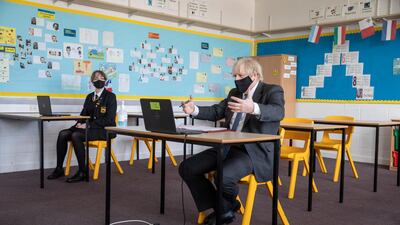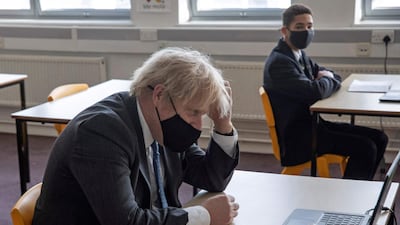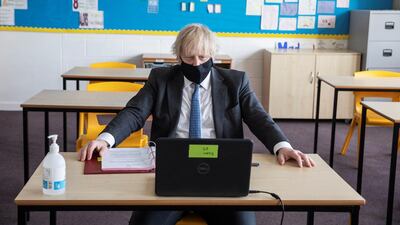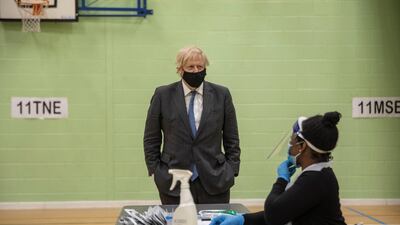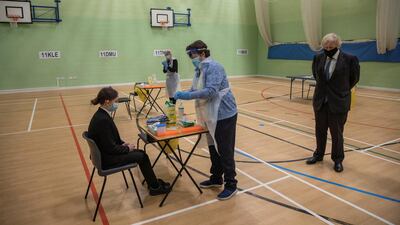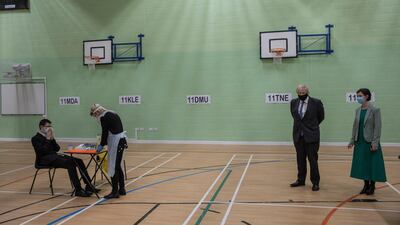Boris Johnson said the UK is on a “one-way road to freedom” after announcing plans to ease lockdown.
The economy will be reopened in four stages between March and mid-June at the earliest, when most restrictions will be lifted for a return to near-normality.
The rules will be eased on these dates only if certain conditions, such as the vaccine campaign going to plan, are met.
The key dates include:
Stage one
March 8
All children and students allowed to return to schools, colleges and universities in England, as well as after-school and before-school clubs. Secondary school pupils will be tested for coronavirus twice a week.
Two adults from different households will be allowed to meet outdoors for a coffee or to sit down on a park bench: until then, such meetings are for exercise only.
Care home residents will be allowed one regular, named visitor.
March 29
Two families of any size can meet outdoors, including in private gardens. The “rule of six” will apply if people from more than two households are meeting.
Outdoor sports such as tennis, golf and grassroots football can resume.
The stay-at-home order will end, with government messaging changing to “stay local”.
Read More
Britons rush to book holidays under roadmap out of lockdown
Boris Johnson lays out England’s lockdown exit strategy
UK could introduce vaccine passport to speed up reopening
People are still encouraged to work from home where possible, while overseas holidays are still banned.
Stage two
April 12 at the earliest
Non-essential retail to reopen, as well as hairdressers and nail salons.
Public buildings such as libraries and museums will reopen, as well as outdoor attractions, including zoos and theme parks. Wider social contact rules apply in all of those settings: people can only attend indoor venues with members of their own household.
Indoor leisure facilities such as gyms and pools to reopen. Hospitality venues including pubs and restaurants will reopen for outdoor service only.
Two families of any size or six people from more than two households can visit. There will be no curfews on hospitality and alcohol can be served without food, unlike in the previous easing of restrictions in November. Customers will still have to be seated when they order food or drink.
Self-contained accommodation such as campsites and holiday lets to reopen but indoor facilities shared with other households is not allowed. Funerals can continue with up to 30 people. Attendance at weddings and wakes rises from six to 15.
Stage three
May 17 at the earliest
As of May 17, limits on seeing friends and family will ease, allowing people to decide on the appropriate level of risk for their circumstances. People in England will be able to hug friends and family again.
Most legal restrictions on meeting others outdoors will be lifted - although gatherings of over 30 people will remain illegal. Indoors, the rule of six or two households will apply.
International travel will also resume.
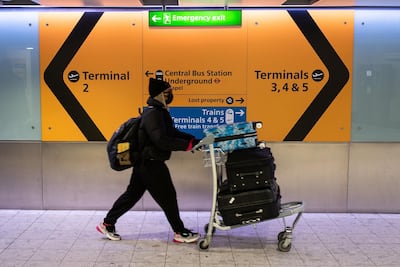
Indoor hospitality will reopen and venues will not have to serve a substantial meal with alcoholic drinks; nor will there be a curfew. Customers will, however, have to order, eat and drink while seated.
Indoor entertainment venues such as cinemas and children’s play areas will reopen, as well as hotels, hostels and B&Bs, and indoor adult group sports and exercise classes.
The government will also allow some larger performances and sporting events in indoor venues with a capacity of 1,000 people or half-full (whichever is lower) to operate again.
Up to 30 people will be able to attend weddings, receptions and wakes, as well as funerals. This limit also applies to other types of significant life events including bar mitzvahs and christenings.
Stage four
Before June 21
Review to report on whether Covid-19 vaccine certificates can play a role in reducing restrictions on social contact and reopening the economy. Review to report on social distancing measures, including on use of face masks and working from home.
June 21 at the earliest
All limits on social contact to be lifted. Final sectors of the economy, such as nightclubs, allowed to reopen. Restrictions lifted on large events and performances. Restrictions lifted on attendance at weddings and other life events.
What are the four tests for easing restrictions?
Vaccine distribution
The country’s Covid-19 vaccination campaign, a success so far, must continue to progress.
Mr Johnson said on Sunday that all adults in the UK aged over 50 would be offered a vaccine by April 15, as would all adults by the end of July.
More than 17 million people in Britain have had at least one vaccine dose, and more than 1,500 vaccine sites in operation.
Vaccine efficacy
Evidence must show that vaccines are effective in reducing hospital admissions and deaths.
The recent decline of both appears to be accelerating in older people, but there is uncertainty over whether this is due mainly to the effects of lockdown or vaccination.
But Vaccine Minister Nadhim Zahawi said the inoculation campaign was “starting to bear fruit” in terms of hospital admissions and deaths.
“Public Health England have been running a couple of large-scale studies,” Mr Zahawi told Sky News.
He spoke of the Siren study, which tested frontline healthcare staff who were given priority in the vaccination campaign, and Vivaldi, which focused on care home residents who were also among those inoculated earliest.
“Suffice to say, the evidence looks good,” Mr Zahawi said.
Prof Neil Ferguson, a senior scientific adviser to the government, suggested last week that vaccines had led to a two-thirds reduction in virus transmission.
“There are two factors we have to look at: one is how quickly our infection levels are declining, in particular how quickly hospital admissions and deaths are declining,” Prof Ferguson said.
“The second is the picture of the real-world effectiveness of vaccines. They are both looking promising at the moment.”
Prof Adam Finn of the University of Bristol said: “Everything is moving in the right direction”.
“We’ve got to the point in our study in Bristol to say vaccines are definitely having an effect – it’s just hard to put an exact number on it at the moment.”
Infection rates
Coronavirus infection rates must be suppressed to prevent hospitals being overwhelmed by new admissions.
In January, the UK moved to its highest Covid alert of level five, a warning that the health service was in danger of being overwhelmed within 21 days.
The situation has since improved but the number of Covid-19 patients in hospital remains higher than during the peak of the first wave last spring.
Data from February 14 revealed the average number of people admitted to hospital with coronavirus was 1,500 daily. That figure was 4,134 at the peak of the third wave, on January 12.
NHS England chief executive Sir Simon Stevens said there were “early signs” that the vaccine campaign was contributing to the fall in Covid-19 hospital admissions.
New variants
Government guidance suggests that leaving lockdown is feasible only when scientists decide that new variants are not a threat to vaccine efficacy.
Last year, the Kent variant caused a surge in the infection rate, throwing government plans for families to reunite over Christmas into disarray.
Evidence suggests that vaccines continue to offer protection against the UK variant, but there is uncertainty over the South African one and the variant first identified in Brazil.
Health Secretary Matt Hancock said the UK must be wary of mutations.
“We’ve got to be vigilant because if one of these new variants doesn’t respond to the vaccine, as well as the variant that is now the standard variant in the UK – the Kent variant – then that’s obviously a very serious risk for the vaccination programme,” Mr Hancock said.
“We’re doing a lot of work to find out the impact of the vaccine on these new variants, especially the ones discovered in Brazil and South Africa, because clearly knowing the answer to that question is critical to understanding how much of a risk the new variants pose.”
